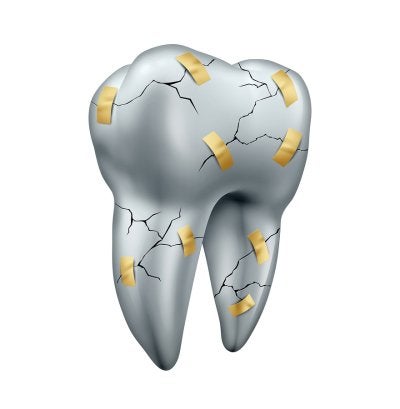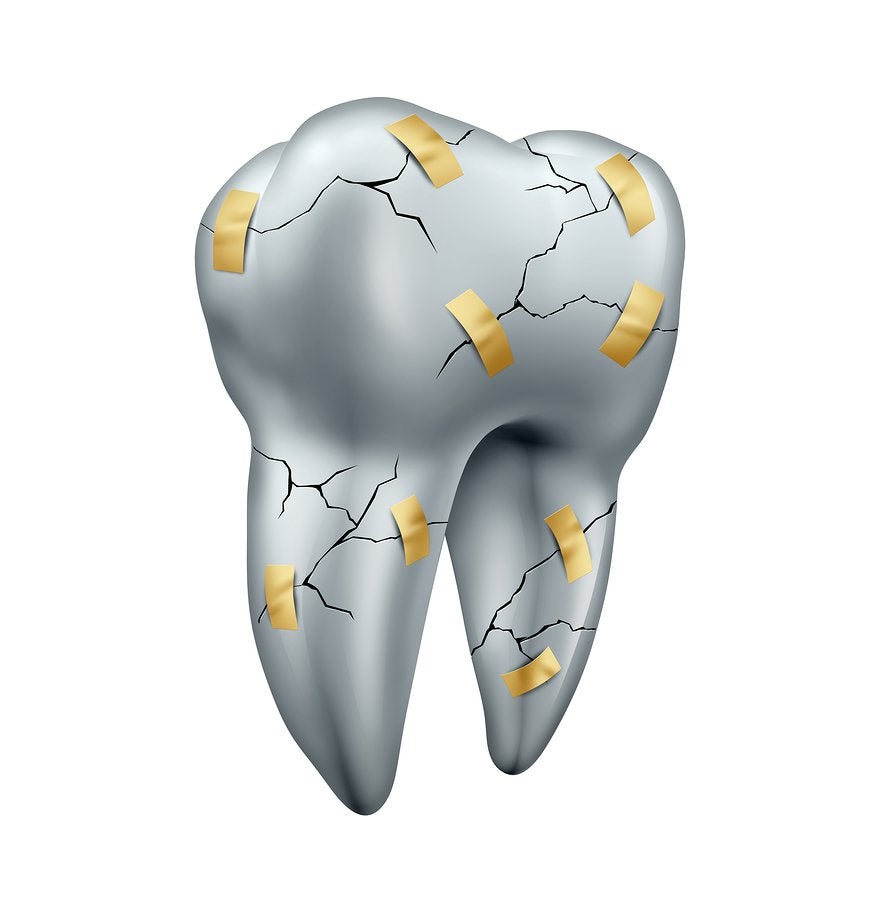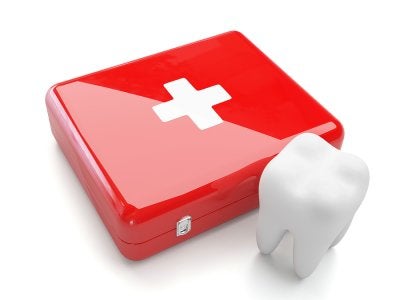-
Proper Flossing Technique
Do you practice proper dental care in Bel Air, MD? Your dentist has probably told you that one of the most important parts of a healthy dental care routine is flossing daily. Be sure to use a proper flossing technique in order to avoid dangerous tooth decay.
Watch this video to learn the details about proper flossing technique. Wrap about 18 inches of floss between your two middle fingers. Then, gently insert the floss between your teeth, working it up and down against the surface of each tooth. Don’t forget to floss behind your back teeth, too! Ask your dentist or local dental clinic if you have any questions about flossing when you have dental work such as a dental bridge or orthodontic appliances.
-
What to Do About a Chipped Tooth
If you have a chipped tooth in Bel Air, MD, your first step should be to contact your dentist. A chipped, cracked, or knocked-out tooth is one of the most common dental emergencies . While a minor chipped tooth may not initially be accompanied by any adverse symptoms, chipped teeth can result in severe tooth pain or sensitivity. Even teeth that do not appear to be damaged can cause major health problems if left untreated. Keep reading to learn more about what you should do about a chipped tooth, including immediate care, professional care, and follow-up care.

Immediate Care
Even before you contact your dentist, you should rinse your mouth with warm water. After you chip a tooth in an accident or fall, bacteria and dirt can enter your mouth. Simply rinsing the affected area goes a long way toward preventing infection. If your mouth is bleeding, apply a clean piece of gauze and press firmly until the bleeding stops. If you cannot get in to your dental clinic on the day of the accident, purchase dental cement from your local drugstore to seal the tooth.
Professional Care
Depending on the size and severity of the chip, your dentist has many options for fixing your chipped tooth. If the chip is extremely small, a dentist may simply smooth and polish the affected area. If your tooth enamel has been damaged and the chip is visible to the naked eye, your dentists may use a filling, dental crown, or cap to restore the look and function of your tooth. If you have severely compromised the tooth structure, you may need a root canal to remove the infected inner tooth pulp.
Follow-Up Care
Follow-up care for your chipped tooth is highly dependent on your dentist’s recommendations. If you have had a root canal or need a prosthetic device like a crown or bridge, your dentist will give you exact instructions on how to care for your restoration and ward off infection. Regardless of your treatment plan, it is essential to maintain proper oral hygiene after chipping a tooth.
-
An Inside Look at Root Canals
A root canal procedure is a method used by general and emergency dentists to save a tooth that has been infected due to decay or trauma. Root canal therapy is an alternative to undergoing a tooth extraction and then having to receive a dental implant or dentures to replace the missing tooth. If you’re in need of a root canal in Bel Air , keep reading to learn more about the procedure.
Why Root Canals Are Necessary
A root canal procedure is necessary if the tooth’s nerve is infected, or if the dental pulp is damaged. When this infection or damage occurs, the nerve root and pulp begin to break down, allowing bacteria to multiply in the pulp chamber. This bacteria can even cause an abscessed tooth. It can also lead to bone loss, drainage problems, or swelling in the face, neck, or head.
bacteria can even cause an abscessed tooth. It can also lead to bone loss, drainage problems, or swelling in the face, neck, or head. What Symptoms Indicate an Infection
If you’re suffering from an infected nerve root or damaged pulp, there may be a few obvious signs and symptoms that you’ll notice. You’ll experience a severe toothache, or intense pain when biting, chewing, or grinding. Your infected tooth will be extremely sensitive to hot and cold temperatures, even when the stimulus is removed. The gum tissue around the infected tooth will become tender, sensitive, inflamed, and swollen. You may notice that the infected tooth has become discolored, or appears darker than surrounding teeth.How a Root Canal Procedure Is Performed
A dentist or endodontist can perform a root canal procedure in the dental office. Your dentist will first take X-rays of your teeth to see how far the infection has spread. You’ll then be given local anesthesia. Your dentist will drill a hole into the infected tooth, through which he’ll remove the decayed nerve root, damaged dental pulp, and any other debris. The tooth is then thoroughly cleaned, injected with medication and antibiotics, and sealed with sealer paste and a rubber compound. Your dentist may recommend that a dental crown be placed on the tooth to further protect it. -
Meet Dr. Danielle Zhu
Home dental care is not enough to keep teeth and gums healthy—you also need to find a great dentist in Bel Air ! A great dentist will help you feel comfortable and make sure you understand concerns and treatment options that can improve your smile.
When you visit Your Smile, you can feel comfortable meeting with Dr. Danielle Zhu. Dr. Zhu specializes in a variety of dental fields, providing treatments for patients of all ages and with an assortment of concerns and dental emergencies. Before becoming a well-known dentist in Bel Air, Dr. Zhu earned her undergraduate degree from UMBC and went on to receive a dental degree from the University of Maryland Dental School. Dr. Zhu also has a prosthodontic clerkship and post doctorate training in advanced general dentistry on her résumé! Along with these accomplishments, patients can also feel comfortable knowing that Dr. Zhu is a member of the American Dental Association, the Academy of General Dentistry, and the Maryland State Dental Association.

-
A Look at Common Dental Emergencies
Do you know what to do in case of a dental emergency? Visiting an emergency dentist in Bel Air is the best way to find help. These dental specialists help patients of all ages with a variety of dental emergencies. This guide can fill you in on some of the most common dental emergencies and what to do if you experience one:
Toothaches
Have you ever gotten food stuck between your teeth? This experience can be annoying but is often remedied with floss or a toothbrush. When
food is hard to reach, it can result in severe pain around the tooth and gum tissue. If you experience a severe toothache, try to remove food residue by rinsing your mouth out with warm water. Next, use dental floss to carefully floss around the affected tooth, as this might remove food debris that can be causing the sensation. If the pain does not subside, you should visit an emergency dentist as soon as possible.
Tooth or Jaw Injuries
Traumatic injuries can severely damage teeth or the jaw bone. These injuries can occur when people fall and tend to be most common among athletes who experience contact with other athletes or hard surfaces. It is important to seek emergency dental care for these traumatic injuries, as they are prone to infection and are often quite painful. Time is especially important when a one or more teeth get knocked out. The teeth may be saved if treated as quickly as possible.Broken or Chipped Teeth
Getting hit in the head can result in a broken or chipped tooth. This not only affects the appearance of your smile, it can also result in pain and difficulty eating. Treat the area by rinsing your mouth out with warm water. Rinse off any pieces of your tooth that you can find and store them in a safe place. Gauze can be used to stop bleeding and a cold compress can be applied to relieve pain and swelling until you get to the emergency dentist. -
How to Handle a Dental Emergency
While you probably strive to protect your mouth and teeth from injury or infection, life isn’t always easy to control. Certain dental situations will require a prompt trip to an emergency dentist near Bel Air , while others may be handled with at-home care until you can see your dentist during regular business hours. Here’s what to do if you find yourself facing a dental emergency:
Stop Any Bleeding
If you sustain injury to the soft tissues of the mouth, or if you have a tooth knocked out, partially dislodged, or broken, it’s vital to stop the bleeding as soon as possible. This can be accomplished by rinsing your mouth gently with a warm saltwater solution and then applying pressure to the area. You may use either a folded piece of gauze or a damp tea bag over the area to keep pressure on for 15 to 20 minutes. If the bleeding is not controlled after that, continue applying pressure but seek treatment immediately either at an emergency room or an emergency dentist.
You may use either a folded piece of gauze or a damp tea bag over the area to keep pressure on for 15 to 20 minutes. If the bleeding is not controlled after that, continue applying pressure but seek treatment immediately either at an emergency room or an emergency dentist. Control Swelling and Pain
Dental emergencies typically come with pain, and often are accompanied by swelling. Unless your doctor has placed restrictions on it, take an over-the-counter pain reliever to help with the pain. Ibuprofen will also help to control inflammation and swelling. Apply cold compresses to the face over the area where there is pain and swelling. A gentle rinse of warm water, either plain or with a touch of salt, can also be soothing until you can get to the emergency dentist.Preserve the Tooth
If your dental emergency involves a dislodged or knocked out tooth, it’s important to keep the tooth viable if at all possible. Do not handle the tooth by the root; pick it up by the crown and very gently rinse it with warm water. Never attempt to clean the attached tissue off the root. If it is possible, reinsert the tooth in its socket, taking care to ensure it is facing the proper direction. If reinsertion is not possible, place the tooth in a container of milk and try to get to the emergency dentist within one hour if at all possible. -
A Look at Common Dental Emergencies
Without the proper attention, dental emergencies can lead to huge, painful issues for your teeth and gums. Keep reading to learn about some of the most common issues so you know when you need to visit the emergency dentist in Bel Air to get immediate attention for your injury:
A Toothache
Severe tooth pain makes it difficult to do anything. A lot of people have to make a special appointment with the emergency dentist to fix toothaches that cause severe pain in the mouth. If you have a toothache that is keeping you from doing your normal daily activities, you should schedule an appointment with a dentist as soon as possible to get the treatment you need to get rid of the pain.
of the pain. A Chipped or Broken Tooth
Whether you take a fall or get hit in the mouth during a sports game, chipping or breaking a tooth is a serious dental emergency that requires immediate attention . If you can find the missing piece of the tooth, you should keep it in some milk to keep it viable until the dentist can examine you. Biting down too hard on the tongue or the lip can also cause an injury that needs the attention of a dentist.A Knocked Out Tooth
If you knock out your entire tooth, you should see an emergency dentist as soon as possible. Clean out your mouth and the tooth to minimize your risk for infection. Put the tooth into some milk and keep it there until you can see your dentist. The sooner you can make an appointment, the better chance you have of salvaging your natural tooth without the need for dental implants.Objects Stuck Between the Teeth
Although it might not seem like a dental emergency, they can create a large problem for your mouth. If you have something stuck between your teeth and you cannot dislodge it with your toothbrush or your floss, you should schedule an appointment with a dentist as soon as possible.
RECENT POSTS
categories
- Uncategorized
- General Dentistry
- Toothache
- Emergency Dentistry
- Family Dentistry
- Receding Gums
- Cosmetic Dentistry
- Veneers
- Gum Disease
- Gingivitis
- Dental Crowns
- Orthodontics
- Dental Implants
- Root Canal
- Wisdom Teeth
- Teeth Whitening
- Your Smile
- Composite Fillings
- Lumineers
- Dentures
- Invisalign
- BrightSmile
- Dental Bridge
- Abscessed Tooth
- Sealants
